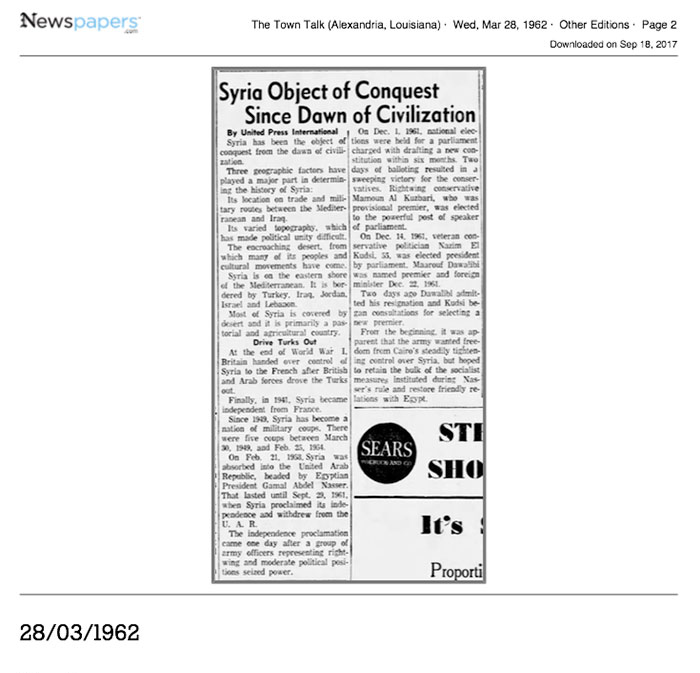Syria Object of Conquest Since Dawn of Civilization - 28/03/1962
Syria Object of Conquest Since Dawn of Civilization
United Press International
Syria has been the object of conquest from the dawn of civilization.
Three geographic factors have played a major part in determining the history of Syria: Its location on trade and military routes between the Mediterranean and Iraq. Its varied topography, which has made political unity difficult. The encroaching desert, from which many of its own peoples and cultural movements have come.
Syria is on the eastern shore of the Mediterranean. It is bordered by Turkey, Iraq, Jordan, Israel and Lebanon.
Most of Syria is covered by desert and it is primarily a pastorial and agricultural country.
Drive Turks Out
At the end of World War I, Britain handed over control of Syria to the French after British and Arab forces drove the Turks out.
Finally, in 1941, Syria became independent from France. Since 1949, Syria has become a nation of military coups. There were five coups between March 30, 1949 and Feb 25, 1954.
On Feb. 21 1958, Syria was absorbed into the United Arab Republic, headed by Egyptian President Gamal Abdel Nasser. That lasted until Sept. 29, 1961, when Syria proclaimed its independence and withdrew from the U.A.R.
The independence proclamation came one day after a group of army officers representing right-wing and moderate political positions seized power.
On Dec. 1, 1961, national elections were held for a parliament charged with drafting a new constitution within six months. Two days of balloting resulted in a sweeping victory for the conservatives. Rightwing conservative Mamoun Al Kuzbari, who was provisional premier, was elected to the powerful post of speaker of parliament.
On Dec. 14. 1961, veteran conservative politician Nazim El Kudsi, 55, was elected president by parliament. Maarouf Dawalibi was named premier and foreign minister Dec. 22 1961.
Two days ago Dawalibi admitted his resignation and Kudsi began consultations for selecting a new premier.
From the beginning, it was apparent that the army wanted freedom from Cairo’s steadily tightening control over Syria, but hoped to retain the bulk of the socialist measures instituted during Nasser’s rule and restore friendly relations with Egypt.
